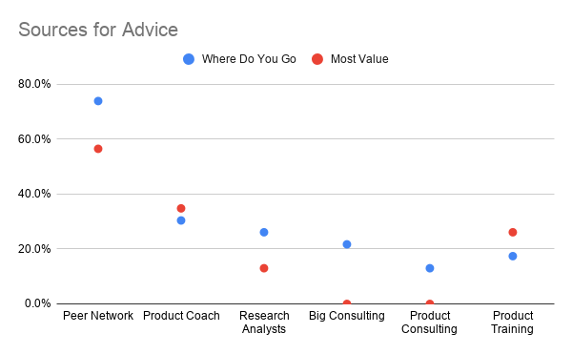Product Management Community: Peer Networks Develop Strong Product Teams
- Grant Hunter

- Feb 23, 2021
- 4 min read
Updated: Jun 7, 2024

Creating peer networks in your product management community can play a significant role in up-skilling product managers by providing insights and advice from experienced product professionals rather than the superficial “training” sessions at meetups and product camps.
Our findings reveal a gap between sources of insights and advice and their value, the core value of product management peer networks, and the opportunity for your product management community to help improve product management professional development results.
Value Gaps in Access to Insights and Advice
The research team at Product Growth Leaders surveyed product leaders to understand how important it was for them to access new product management insights and advice, including where they access advice and which provides the most value.
The results show that product leaders see access to insights and advice as very important.
82% of respondents scored 7 out of 10 or higher for themselves and their teams. This access is critical, and we think a crucial part of product management professional development.
We then looked at where they go for access to new ideas and advice and where they see the most value.
Peer Network ranked as the top source for Access to New Ideas (70% of respondents) and Advice (74%).
Conferences and Events was a close second at 61% for access to new ideas, with no other source scoring above 30%.
No other source was even close for access to Advice, with Product Management Coach/Advisor coming in second with 30%, less than half that of Peer Network.
Shifting to where product leaders see the most value for Access to New Ideas, Conferences and Events were ranked most valuable by 44% of respondents, while Peer Network was 30%, with no other source above 20%.

Peer Network is where product leaders saw the most value for advice, at 57%, while Product Management Coach/Advisor was second at 35%.[i]

[i] Multiple answers were allowed for each respondent leading to the sum of the scores being greater than 100%.
These results identify that Peer Networks are crucial for both professional Advice and new product management ideas. With an improvement in the value seen, peer networks are an excellent mechanism to improve product management professional development.
Core Value of Product Management Peer Networks
"Now two minds ever come together without thereby creating a third, invisible, intangible force, which may be likened to a third mind [the master mind]" –Napoleon Hill
Seeing the vital role Peer Networks play as a source for access to new ideas and Advice, we researched the history and core value proposition for peer networks, specifically formal peer networks with a regular schedule, common participants, and a defined agenda.
Formal peer networks have become an industry in business communities.
There are now many peer network options for executives, entrepreneurs, and functional leadership, from Global 100 to Vistage to The Conference Board and more.
Many of these groups look at the Mastermind Group concept, introduced by Napoleon Hill in his book "Think and Grow Rich" (1937), as their inspiration.
Most peer networks or mastermind groups share a consistent view on the value of these groups that include:
A chance to learn from and with others;
A trusted circle of peers to help you make decisions and provide advice;
Accountability to your peers and the group;
A confidential space to discuss challenges and problems; and
The value of regular connection and shared empathy.
Dorie Clark, an expert in self-reinvention and branding, says:
"It's very powerful to have a supportive group of fellow professionals asks incisive questions that can spark new ideas and ensure you're working on the initiatives that will really move the needle."
Best practices for peer networks include:
Monthly and semi-annually meetings, with monthly meetings lasting between 90 minutes and a full-day and semi-annual meetings regularly scheduled for two days.
A group should have at least 5 to 10 members and no more than 15 to 20 to gain access to enough diversity of thoughts and ideas while still ensuring the right level of trust and intimacy.
To summarize the best practice, look for a peer network of about a dozen professionals that meets monthly.
The Opportunity for Peer Networks as Part of Professional Development
Product management peer networks are not new. There are multiple opportunities for ongoing peer networks and periodic cohorts for heads of products and chief product officers. With that said, the senior-most level is not where we see the best opportunity to impact product management professional development results.
There are already options for senior professionals, and those individuals are already at the top of their profession.
Impact product management professional development results in middle management.
The emerging leaders who assume more responsibility, whether as people manager or platform/portfolio manager, aspire for more. Those product leaders are one or two steps more along their journey.
These product leaders have often moved from individual contributor roles. They may now be managing their former peers, and they do not have many trusted contacts who are true peers.
Building a formal peer network is a critical step to strengthen the professional development of the future heads of product and, in turn, their teams.
Product leaders benefit from peer networks regardless of whether the network is self-managed with former co-workers or comprised of peers in your region who are on the same path.
We understand the value of product management peer networks first-hand.
The initial concept for Product Growth Leaders came through a self-managed peer network, and we have first-hand experience as speakers, members, and facilitators of professionally managed peer networks.
Because of this experience and the opportunity to improve product management professional development with peer networks, we created Product Growth Leaders Peer Networks.
You might enjoy reading our eBook, "The Business Role of Product Management" to learn how to improve the business performance of your products.




